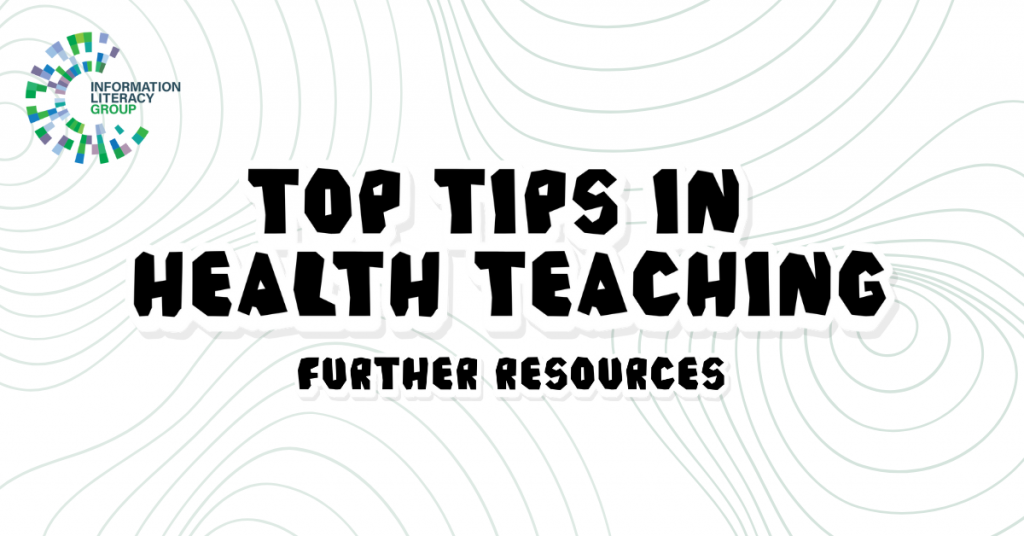In September, we held an event for health librarians (and anyone else interested) called Top Tips for Health Teaching: a Knowledge Sharing Workshop. The aim of this event was for those who teach health staff to come together in a safe space to share their experiences, feelings and top tips about teaching and training. The event included three presentations about teaching critical appraisal, teaching searching and teaching reflective practice, as well as general discussions and breakout rooms.
We’re putting together a series of blogs following this event to summarise and share your wonderful top tips. Our first blog is collating all the resources that have helped others with their teaching practice.
Note: in these blogs we refer to health librarians as teachers but we are aware that the terminology doesn’t feel appropriate for everyone. Some think of themselves as teachers, trainers and/or facilitators, or even something different. Stay tuned for a further blog post about this topic!
Further resources for critical appraisal teaching
- John Blenkinopp’s Introductory Critical Appraisal training, NHS North Tees and Hartlepool: https://www.nth.nhs.uk/news/nhs-trainer-leading-acclaimed-national-course-for-health-staff/
This course was praised by several attendees as being incredibly useful for those who want to gain more confidence and understanding of critical appraisal. He also uses several teaching elements, for example calculation sheet activities, that previous attendees have appropriated into their own teaching. To find out more and to book contact: nth-tr.ceu@nhs.net
- The Bottom Line: https://www.thebottomline.org.uk/
This website was built to collate landmark clinical papers and each article has been summarised and critiqued using a standard template. Each one includes strengths and weaknesses of the study and finishes with a ‘bottom line’ conclusion to remind of the key points. This was suggested as a helpful way to find and prep articles to use in a critical appraisal session.
- Critically Appraising the Evidence Base e-learning programme: https://www.e-lfh.org.uk/programmes/critically-appraising-the-evidence-base/
This e-learning developed by the NHS Knowledge for Healthcare Learning Academy contains 8 short modules to introduce you to critical appraisal. It’s applicable to health and care staff at all levels and can be ‘dipped into’ to refresh knowledge or completed as a whole. Whilst this can be promoted to healthcare staff to complete themselves, it can also be useful for health librarians to refresh their skills or knowledge.
- The Mental Elf: https://www.nationalelfservice.net/mental-health/
Similarly to The Bottom Line, the Mental Elf reviews and summarises current articles, specifically focusing on mental health topics. Their summaries include strengths and limitations as well as implications for practice.
- Understanding health research: https://www.understandinghealthresearch.org/
This tool will help you to understand and appraise a research article by guiding you through a series of questions. It was created by the Medical Research Council, Chief Scientist Office and Public Health Sciences Unit at the University of Glasgow. The website also has further information including bias, replicability and how to read a scientific paper.
- Helpful books:
- How to read a paper: the basics of evidence-based healthcare, Trisha Greenhalgh and Paul Dijkstra, 2025 7th ed.
-
- The doctor’s guide to critical appraisal, Narinder Kaur Gosall, Gurpal Singh Gosall, 2020 5th ed.
- Medical statistics made easy, Michael Harris and Gordon Taylor, 2020 4th ed.
Further resources for teaching reflective practice
- Four levels of reflection, Jenny Moon: https://thecvmethod.wordpress.com/2016/11/07/four-levels-of-reflection-jenny-moon/
Jenny Moon’s Four Levels of Reflection model is helpful in breaking down the reflective process into stages and shows a step-by-step process going from a simple account to a full-blown reflection.
- Reflective reading group: improving research skills and confidence, Alison Welfare-Wilson and Hayley Beresford, Nursing Times article: https://www.nursingtimes.net/education-and-training/reflective-reading-group-improving-research-skills-and-confidence-22-07-2024/
This article describes a cross-trust initiative where a reflective reading club for mental health nurses and allied health professionals was created and delivered online bimonthly. This has inspired other trusts to provide a similar reflective reading club.
- Beginner’s Guide to Reflective Practice in Nursing, Catherine Delves-Yates, 2025 2nd ed.
Written for the specific needs of nursing students and trainee nursing associates, this has been recommended as a go-to guide for using reflection to succeed in your studies and practice.
What resources have you found helpful? Share them with us and let’s continue the conversation!




I appreciate this helpful and informative article. The explanation is clear and easy to follow. Thank you for sharing such valuable and high-quality content.